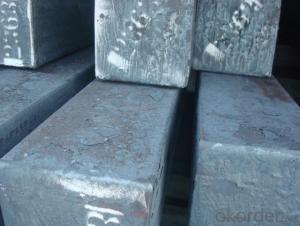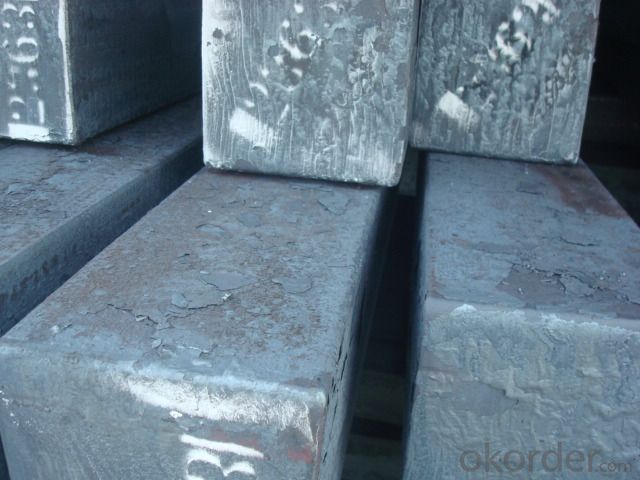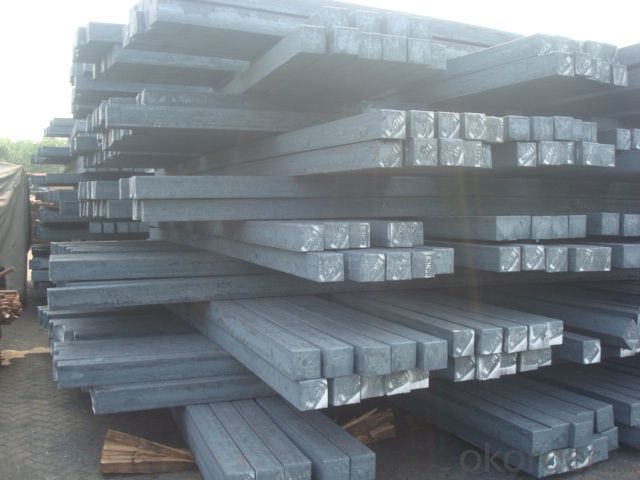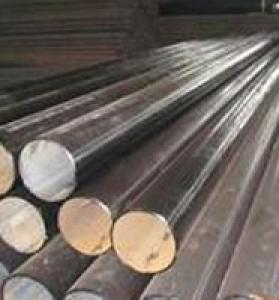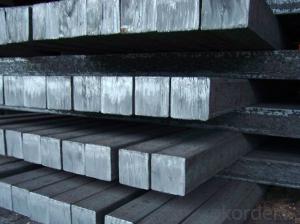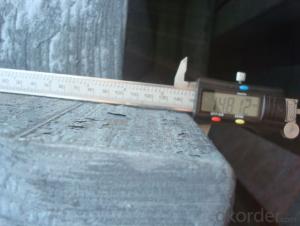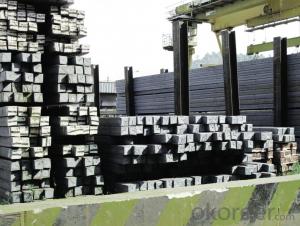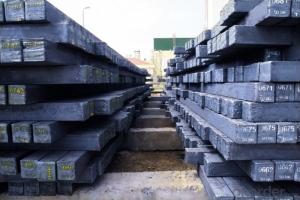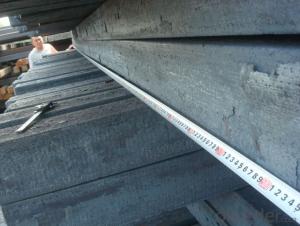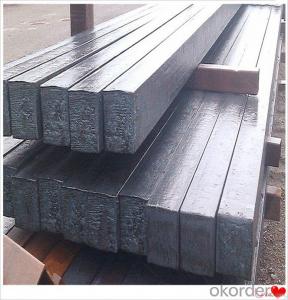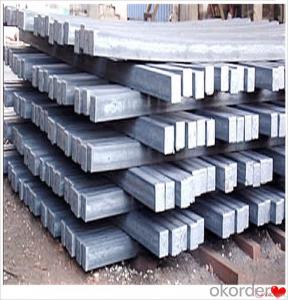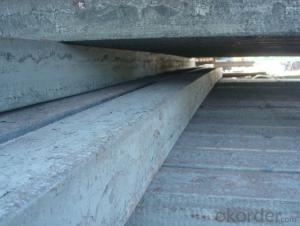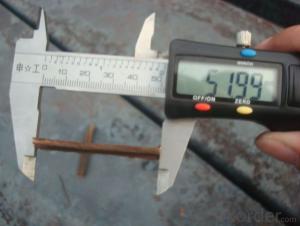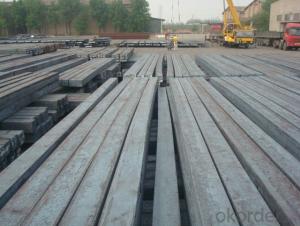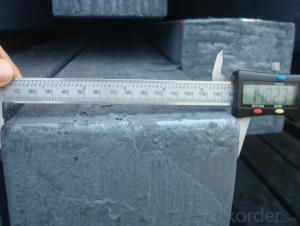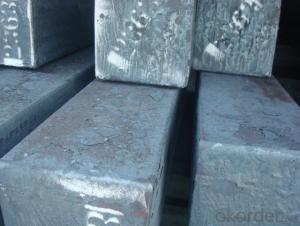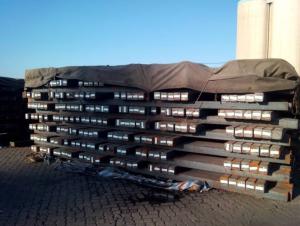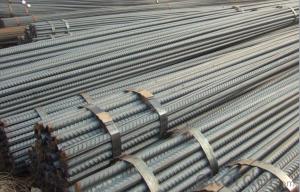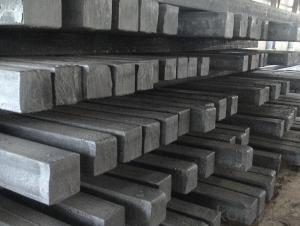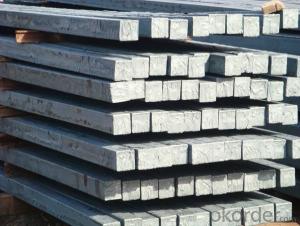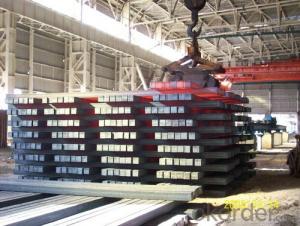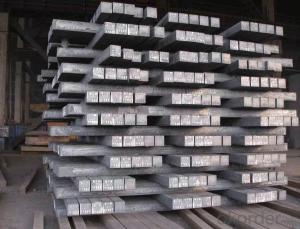Steel Billet Manufactured by Blast Furnace with Good Quality
- Loading Port:
- Tianjin
- Payment Terms:
- TT OR LC
- Min Order Qty:
- 1000 m.t.
- Supply Capability:
- 100000 m.t./month
OKorder Service Pledge
OKorder Financial Service
You Might Also Like
Steel Billet Manufactured by Blast Furnace with Good Quality
1.Structure of Steel Billet Manufactured by Blast Furnace with Good Quality
Steel Billet Manufactured by Blast Furnace without Boron is the raw material of all kinds of steel mill. Billet section of square, round, flat, rectangular and abnormity, etc Several, mainly related to shape of rolled products. Simple rolled section steel, choose cross section of square billet or rectangular billet. rolling The sector products such as flat steel, Angle steel, select the rectangular billet or slab. Had better profiled billet when production beams, channels, and in rolling process Lines and improve the yield. The raw material of round billet is the production of seamless tube.
2.Main Features of Steel Billet Manufactured by Blast Furnace with Good Quality
Steel Billet Manufactured by Blast Furnace without Boron section size should meet the requirements of rolling deformation and finished product quality, but also roll strength and biting condition of restrictions. General steel Billet section height H. And the roll diameter D The ratio of the ( namely H/D) Should be less than or equal to zero 0.5 . Length of steel billet by finishing temperature, Rolling time and the length of the product Or times ruler. When heated too long accident prone to bump the furnace wall of steel, too short, furnace bottom utilization rate is not high, influence the heating furnace production. For the production Choose a variety of steel and steel billet, should consider the affinities of billet, as far as possible in order to improve the productivity of the roughing mill, simplify the stock management of workshop.
3. Steel Billet Manufactured by Blast Furnace with Good Quality Images
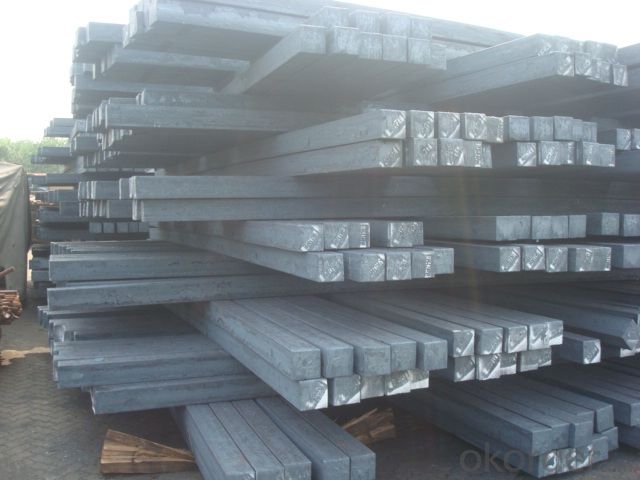
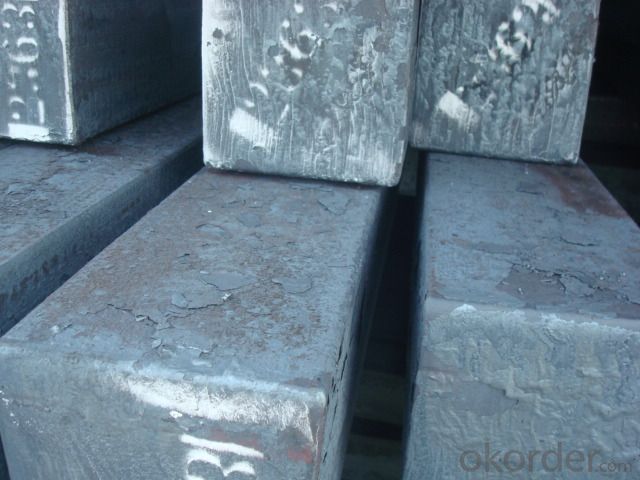
4. Steel Billet Manufactured by Blast Furnace with Good Quality Specification
Steel Billet Manufactured by Blast Furnace without Boron rolled steel, after processing can be used for mechanical parts, forging parts, processing all kinds of steel, steel Q345B channel steel, wire rod is the role of the billet. Steel billet is used in the production of semi-finished products, generally cannot be used directly for the society. Steel billets and steel are strictly divided into standard, cannot decide to whether the business enterprise of the final product, and according to unified standards to perform the whole society. Typically, billet and the steel is relatively easy to distinguish, but for some steel billet, and have the same specification and same steel purposes (such as rolling tube billet), whether can be used for other industries, whether through steel processing process, whether through a finished product rolling mill processing to distinguish
The classification of the Bloom Mainly from the shape is divided into two kinds: Slab: cross section width and height of the ratio of the larger, mainly used for rolling plate. Bloom: equal cross section width and height, or a huge difference, mainly used for rolling steel, wire rod.
Bloom material standard The thickness range: 150-240 - mm + / - 5 mm The width of the range: 880-1530 - mm + / - 20 mm Length range: 3700-10000 - mm + / - 500 - mm Cross-sectional size: 64 * 64 ; 82 * 82 ; 98 * 98 ; 124 * 124 ; 120 * 150 ; 152 * 164 ; 152 * 170 mm Length: 9000 mm The section of tolerance: Bloom: 1.0 + / - 2.0-1.0 + / - 1.0 mm The slab width: + / - 2.0 MM ; Thickness: + / - 3.0 MM
5.FAQ of Steel Billet Manufactured by Blast Furnace with Good Quality
We have organized several common questions for our clients,may help you sincerely:
①What kinds of the spec. you can supply?
Q195/Q215/Q235/Q255/Q275 or other chemical composition you require.
②What is the standard of the steel billet?
Chinese standard is GB700.
③How is the packaging and delivery?
Exporting Package with the steel material cover and the delivery term is based on the project.
- Q: Are steel billets used in the manufacturing of oil and gas pipelines?
- Oil and gas pipelines are commonly manufactured using steel billets. These billets are semi-finished products that are created through continuous casting, a process that solidifies molten steel into a rectangular form. They are utilized as the initial material for various steel products, specifically pipes for the oil and gas sector. The manufacturing process for oil and gas pipelines involves multiple steps, one of which is the production of seamless or welded steel pipes. Steel billets are heated and then rolled into tubes or pipes through a procedure known as pipe making. In the case of seamless pipes, the heated billet is pierced to create a hollow shell, which is subsequently elongated and shaped into a pipe. On the other hand, welded pipes are formed by rolling and welding a flat steel plate to construct a tube. The utilization of steel billets in pipeline manufacturing is favored due to steel's outstanding mechanical properties, which include strength, durability, and resistance to corrosion. These attributes make steel an ideal material for pipelines that must endure high-pressure environments and harsh conditions. Moreover, steel billets can be tailored in terms of size, shape, and composition to satisfy the specific requirements of each pipeline project. To summarize, steel billets play a critical role in the production of oil and gas pipelines. They serve as the raw material that undergoes transformation into seamless or welded pipes, enabling the transportation of oil and gas over long distances. The use of steel guarantees the dependability and integrity of these pipelines, establishing them as indispensable components of the oil and gas industry.
- Q: How is the quality of steel billets ensured during production?
- The quality of steel billets is ensured during production through various measures such as regular testing and inspection. This includes conducting chemical analysis to ensure the correct composition, as well as mechanical testing to check the strength and durability of the billets. Additionally, visual inspections are carried out to identify any surface defects or imperfections. Strict quality control measures are implemented at every stage of the production process to ensure that the steel billets meet the required standards and specifications.
- Q: What are the applications of steel billets in the automotive industry?
- Steel billets have several applications in the automotive industry. They are used as raw materials for forging various components like crankshafts, connecting rods, camshafts, and gears. Additionally, steel billets are utilized in the production of chassis and body frames, providing strength and durability to vehicles. They are also used for manufacturing suspension systems, axles, and other critical automotive parts that require high-strength materials.
- Q: How are steel billets distributed in the market?
- Steel billets are distributed in the market through various channels such as steel mills, steel service centers, and steel distributors. These entities source the billets from steel producers and then supply them to various industries and customers, including construction, manufacturing, and infrastructure. The distribution process involves logistics, warehousing, and transportation to ensure timely delivery to the end-users.
- Q: What are the different surface finishes available for tool steel billets?
- Tool steel billets offer a range of surface finishes to cater to different requirements and applications. Some commonly used surface finishes are as follows: 1. Hot Rolled: This is the most basic surface finish achieved by hot rolling the steel billets, resulting in a rough and scaled surface. It is suitable for applications where a smooth finish is not crucial. 2. Cold Rolled: For a smoother and refined surface finish, the steel billets undergo cold rolling. Cold rolled surfaces are preferred when a higher degree of precision and accuracy is required. 3. Turned: By using a lathe to remove material, the steel billet can achieve a smooth and polished surface finish. Turned surfaces are commonly employed in applications where aesthetic appearance and precision components are essential. 4. Ground: Grinding is employed to achieve a flat and smooth surface finish on tool steel billets. It is commonly utilized when a high level of precision and dimensional accuracy is necessary, particularly in tooling applications. 5. Polished: This is the most refined surface finish achieved by using abrasives and polishing compounds, resulting in a mirror-like surface. Polished surfaces are often chosen for decorative or high-end applications where a visually appealing finish is desired. 6. Coated: Additionally, tool steel billets can be coated with various materials to enhance their surface properties. Coatings such as nitride, carbide, or diamond-like carbon (DLC) can improve hardness, wear resistance, and friction properties. The choice of surface finish for tool steel billets depends on specific requirements, including desired accuracy, appearance, and performance characteristics.
- Q: What are the main factors affecting the magnetic properties of steel billets?
- The main factors affecting the magnetic properties of steel billets are composition, microstructure, and processing conditions. Firstly, the composition of the steel billet plays a significant role in its magnetic properties. The presence of certain alloying elements, such as nickel, cobalt, and manganese, can enhance the magnetic properties of steel. These elements align the magnetic domains within the steel, resulting in increased magnetization and improved magnetic properties. Secondly, the microstructure of the steel billet affects its magnetic properties. The grain size, crystal structure, and presence of defects or impurities can influence the magnetic behavior of the material. Finer grain sizes tend to have better magnetic properties due to improved alignment of the magnetic domains. Additionally, a single-phase crystal structure is generally more magnetic than a multi-phase structure. Lastly, the processing conditions during the production of steel billets can impact their magnetic properties. Factors such as temperature, cooling rate, and mechanical deformation can affect the microstructure and, consequently, the magnetic behavior. For example, rapid cooling can result in a finer grain size and better magnetic properties, while mechanical deformation can induce magnetic anisotropy, making the steel more magnetically oriented along a specific direction. In summary, the magnetic properties of steel billets are mainly influenced by the composition, microstructure, and processing conditions. By controlling these factors, manufacturers can tailor the magnetic properties of steel billets to meet specific requirements for various applications, such as in electrical transformers, motors, or magnetic sensors.
- Q: Can steel billets be used in the production of utensils and cutlery?
- Yes, steel billets can be used in the production of utensils and cutlery. Steel billets are typically processed and shaped into various forms such as sheets, bars, or rods, which can then be further manufactured into utensils and cutlery items through processes like forging, casting, or stamping.
- Q: What are the different types of steel used in manufacturing steel billets?
- Steel billets are manufactured using various types of steel, including carbon steel, stainless steel, alloy steel, and tool steel. 1. Carbon Steel: The most commonly used steel for manufacturing steel billets is carbon steel. It contains a small percentage of carbon (typically 0.05% to 0.25%), which provides it with strength and durability. Carbon steel is versatile and can be used in a wide range of applications. 2. Stainless Steel: Stainless steel is highly regarded for its corrosion resistance and high strength. It contains chromium, which forms a protective oxide layer on the surface, preventing rust and corrosion. Stainless steel is commonly used in applications where resistance to moisture and chemicals is necessary, such as in the construction of bridges and buildings. 3. Alloy Steel: Alloy steel is created by adding different alloying elements to carbon steel, including manganese, nickel, chromium, and molybdenum. These elements enhance the steel's properties, such as its strength, hardness, and resistance to wear and tear. The automotive and aerospace industries frequently employ alloy steel. 4. Tool Steel: Tool steel is specifically designed to possess high hardness, resistance to abrasion, and the ability to withstand high temperatures. It is frequently utilized in the production of cutting tools, molds, and dies. Tool steel typically comprises a combination of alloying elements, such as tungsten, vanadium, and cobalt. These examples represent a few of the diverse types of steel employed in the manufacturing of steel billets. The selection of the specific steel type relies on the desired properties and intended application of the steel billets.
- Q: How to calculate the cost price of billet?
- That depends on what kind of material you are producing steel billet, and are generally the city's iron ore came.
- Q: What are the different heat treatment processes applied to steel billets?
- Steel billets can undergo various heat treatment processes to achieve specific properties and characteristics in the final product. Common processes include: 1. Annealing: Steel billets are heated to high temperatures and then slowly cooled, often in a controlled atmosphere or furnace. This relieves internal stresses, enhances machinability, and improves ductility and toughness. 2. Normalizing: Steel billets are heated above the critical range and then air-cooled. This process refines the grain structure, improves mechanical properties, and enhances machinability. 3. Quenching: Steel billets are rapidly cooled by immersing them in a quenching medium (e.g., water, oil, or polymer) after being heated to high temperatures. This creates a hardened and stronger steel with improved wear resistance, but brittleness may increase. 4. Tempering: After quenching, hardened steel billets are reheated to a specific temperature and then cooled in still air. Tempering relieves residual stresses, reduces brittleness, and improves toughness and ductility. 5. Austempering: Steel billets are quenched in a molten salt bath or another medium just above the critical range and held at that temperature until the desired transformation occurs. Austempering results in high strength, improved ductility, and reduced distortion. 6. Martempering: Similar to austempering, martempering involves a shorter holding time at the quenching temperature. This process produces a steel with high strength, toughness, and reduced distortion. 7. Case hardening: Carbon is added to the surface layer of steel billets through carburizing or nitriding. This forms a hardened case with increased wear resistance while maintaining a more ductile core. These examples illustrate some of the heat treatment processes applicable to steel billets. The specific process chosen depends on the desired properties of the final product and the type of steel being treated.
Send your message to us
Steel Billet Manufactured by Blast Furnace with Good Quality
- Loading Port:
- Tianjin
- Payment Terms:
- TT OR LC
- Min Order Qty:
- 1000 m.t.
- Supply Capability:
- 100000 m.t./month
OKorder Service Pledge
OKorder Financial Service
Similar products
Hot products
Hot Searches
Related keywords
